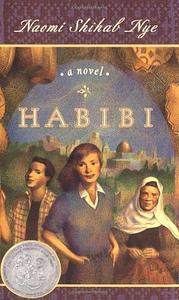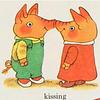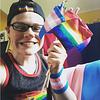You need to sign in or sign up before continuing.
Take a photo of a barcode or cover
Naomi Shihab Nye is one of the kindest writers one could hope to meet, and the proof is all over her writing, which is full of open-hearted curiosity and awareness. Her protagonist, Liyana, may be a half-American, half-Palestinian moving out of America to her father's homeland, but Nye's writing turns the uprooting experience universal. Exploring a new city, meeting new people and family, and struggling with all of the languages and customs of a new country feel like familiar growing pains via Nye's pen, including the ever-present conflict between Jews and Arabs.
Nye treats the topic of Israel/Palestine conflict with a gentle hand, but she's not so nice as to be naive. Families are searched at borders. A couple of acts of police violence bring the conflict home to Liyana's family in a way that can't be kumbaya'd away, but that doesn't mean Nye won't leave the door open for hope and friendship where potential exists. Her lyrical prose is like a pen pal letter to your heart.
It also doesn't hurt that the book references the works of William Saroyan and Diane Ackerman, two more authors who made the world a more welcoming place.
Nye treats the topic of Israel/Palestine conflict with a gentle hand, but she's not so nice as to be naive. Families are searched at borders. A couple of acts of police violence bring the conflict home to Liyana's family in a way that can't be kumbaya'd away, but that doesn't mean Nye won't leave the door open for hope and friendship where potential exists. Her lyrical prose is like a pen pal letter to your heart.
It also doesn't hurt that the book references the works of William Saroyan and Diane Ackerman, two more authors who made the world a more welcoming place.
When poets write novels, it can be a beautiful thing. This book had a lovely romance and cross-cultural education.
**spoilers**
Naomi Shihab Nye's Habibi is a poetic, multicultural masterpiece. Having been acquainted with Shihab Nye through previous works and an interview she gave with NPR's On Being, I felt the semi-autobiographical nature of the book. I loved Liyana's meeting of her Arab family members and her father's land. Shihab Nye doesn't seem to have much compulsion to explicate her story in boring detail, giving only enough to keep the reader understanding and then leaving other parts of the story to be inferred from poetic morsels.
The Palestinian-Israeli Conflict is ever woven through the strands of the novel. At first, I felt that Liyana's friendship/crush on Omer was cliche such as the common trope of defiant American girl pursuing her own romance with someone she fell in love with at first sight. But Omer is so much more symbolically important to the story, and as someone who loves both Israelis and Palestinian, Indians and Pakistanis, European-Americans and African-Americans, I want desperately to believe that peace and reconciliation can be possible. Omer's friendship, his introduction to Sitti, the generally positive reception of Omer as representative of Israelis is so "And they lived happily ever after..."
Shihab Nye doesn't shy away from the injustices against Palestinians or the prejudice from both sides. (Palestinian resistance is fairly non-existant in the book too, so that perspective has been overlooked here.) One either forgets to truth-tell about injustice or forget that friendships can be a bridge to reconcile. Is it worth our vengeance to block ourselves from the blessing of a whole group of people who share the same earth as us? Though it is painful, though restoration and justice needs to come forth, what is it not all for but the healing of our broken humanity?
P.S. As a native Missourian, I love all the references to St. Louis and Missouri.
Naomi Shihab Nye's Habibi is a poetic, multicultural masterpiece. Having been acquainted with Shihab Nye through previous works and an interview she gave with NPR's On Being, I felt the semi-autobiographical nature of the book. I loved Liyana's meeting of her Arab family members and her father's land. Shihab Nye doesn't seem to have much compulsion to explicate her story in boring detail, giving only enough to keep the reader understanding and then leaving other parts of the story to be inferred from poetic morsels.
The Palestinian-Israeli Conflict is ever woven through the strands of the novel. At first, I felt that Liyana's friendship/crush on Omer was cliche such as the common trope of defiant American girl pursuing her own romance with someone she fell in love with at first sight. But Omer is so much more symbolically important to the story, and as someone who loves both Israelis and Palestinian, Indians and Pakistanis, European-Americans and African-Americans, I want desperately to believe that peace and reconciliation can be possible. Omer's friendship, his introduction to Sitti, the generally positive reception of Omer as representative of Israelis is so "And they lived happily ever after..."
Shihab Nye doesn't shy away from the injustices against Palestinians or the prejudice from both sides. (Palestinian resistance is fairly non-existant in the book too, so that perspective has been overlooked here.) One either forgets to truth-tell about injustice or forget that friendships can be a bridge to reconcile. Is it worth our vengeance to block ourselves from the blessing of a whole group of people who share the same earth as us? Though it is painful, though restoration and justice needs to come forth, what is it not all for but the healing of our broken humanity?
P.S. As a native Missourian, I love all the references to St. Louis and Missouri.
Sometimes i just get into the mood to eat through a childhood classic in a few sittings and a friend of mine was complaining about the Other Habibi so I was reminded of this (much better) Habibi. I was given a copy of this when I was pretty young, maybe 9 or so by I think my grandmother which is weird because she doesn't read much, and engages in nuanced thinking even less.
Regardless, this was the first introduction I ever really had to Palestinians or even Arabs in general that wasn't from Bush-era news. A lot of the Palestinian identity was lost on me, I didn't know what the Nakba was and the only Arabic I knew was habibi (which I learned in this book). Reading back now I can appreciate Shihab Nye's skill for people and place, something that transfers over from her poetry. When I was a kid I gravitated to the poetic nature of the prose, and protagonist Liyana, I wanted to be her so bad, and would even go around writing first lines and short poems in notebooks like she did.
Ultimately the outlook in this novel is (if I'm being charitable) a little simplistic, a product possibly of its time. I was surprised to find this less "both sides bad" than I was worried it was going to be, Shihab Nye obviously writes from personal experience and is not afraid to plainly list the violence against Palestine. The conclusion that everyone just needs to get along and mind their own business is not one that is particularly nuanced, but this is a young adult novel so I would not expect the same complexity from theory or history.
Maybe I'm just hit by nostalgia, but I wish this were a more popular work than it is. There's a constant effort to make and make and make and read and read new literature especially young adult literature, but sometimes its worth looking back a bit and reading a short novel from the year I was born.
Regardless, this was the first introduction I ever really had to Palestinians or even Arabs in general that wasn't from Bush-era news. A lot of the Palestinian identity was lost on me, I didn't know what the Nakba was and the only Arabic I knew was habibi (which I learned in this book). Reading back now I can appreciate Shihab Nye's skill for people and place, something that transfers over from her poetry. When I was a kid I gravitated to the poetic nature of the prose, and protagonist Liyana, I wanted to be her so bad, and would even go around writing first lines and short poems in notebooks like she did.
Ultimately the outlook in this novel is (if I'm being charitable) a little simplistic, a product possibly of its time. I was surprised to find this less "both sides bad" than I was worried it was going to be, Shihab Nye obviously writes from personal experience and is not afraid to plainly list the violence against Palestine. The conclusion that everyone just needs to get along and mind their own business is not one that is particularly nuanced, but this is a young adult novel so I would not expect the same complexity from theory or history.
Maybe I'm just hit by nostalgia, but I wish this were a more popular work than it is. There's a constant effort to make and make and make and read and read new literature especially young adult literature, but sometimes its worth looking back a bit and reading a short novel from the year I was born.
The book was slow to start but I absolutely loved the poetic writing style. Even though this book is set nearly 30 years in the past it feels so current, because the occupation has continued and gotten worse. The author’s stance is clear, she unapologetically calls out oppression (in a teen-appropriate way of course) but also expresses her desire for peace. It’s an optimistic book and that’s what I loved about it. I would definitely recommend.
Why didn't this win a Newbery? It's an outrage!
I love Naomi and this book is just fantastic! Maybe it's wrong to do this, but I imagine it as her childhood. Liyana is just how I would think Naomi was when she was growing up. I love the first lines that begin each chapter. Naomi's writing is poetry in prose form. It's great to watch Liyana interact with her grandmother who speaks another language and has such a different sense of reality. Reading this book was a magical experience for me.
I love Naomi and this book is just fantastic! Maybe it's wrong to do this, but I imagine it as her childhood. Liyana is just how I would think Naomi was when she was growing up. I love the first lines that begin each chapter. Naomi's writing is poetry in prose form. It's great to watch Liyana interact with her grandmother who speaks another language and has such a different sense of reality. Reading this book was a magical experience for me.
adventurous
hopeful
informative
medium-paced
Plot or Character Driven:
Character
Strong character development:
Yes
Loveable characters:
Yes
Diverse cast of characters:
Yes
Flaws of characters a main focus:
No
A sweet story told in beautiful writing. I always love prose written by poets.
The story was a little wandering, definitely more character- than plot-focused. That was fitting as a story told from the perspective of a dreamy, thoughtful teen. Liyana seemed a little mature/overly wise for her age, which I think tends to happen in middle grade written by adults. However, Liyana's youthful lens made this a great "intro" novel for someone like me, interested in reading Palestinian fiction but intimidated about where to start.
This is a timeless novel; it's both lovely and sad/frustrating that the cultural and policial issues Liyana observes during her time in Palestine are still topical now. I felt the ending of this book was a little abrupt. I wanted to know more about where Liyana and her family go, what they do next.
My experience reading this book won't be forgotten; I wish I'd read it when I was younger!
The story was a little wandering, definitely more character- than plot-focused. That was fitting as a story told from the perspective of a dreamy, thoughtful teen. Liyana seemed a little mature/overly wise for her age, which I think tends to happen in middle grade written by adults. However, Liyana's youthful lens made this a great "intro" novel for someone like me, interested in reading Palestinian fiction but intimidated about where to start.
This is a timeless novel; it's both lovely and sad/frustrating that the cultural and policial issues Liyana observes during her time in Palestine are still topical now. I felt the ending of this book was a little abrupt. I wanted to know more about where Liyana and her family go, what they do next.
My experience reading this book won't be forgotten; I wish I'd read it when I was younger!
Moderate: Gun violence
Minor: Racism, Violence, Xenophobia, Death of parent, Colonisation, Injury/Injury detail
I loved this book. I went in biased, because Naomi Shihab Nye is one of my favorite poets. I found the ending a bit unsatisfying, but overall the characterization and writing was just lovely.
challenging
emotional
hopeful
medium-paced
Plot or Character Driven:
Character
Strong character development:
Yes
Loveable characters:
Yes
Diverse cast of characters:
Yes
Flaws of characters a main focus:
No
emotional
hopeful
inspiring
reflective
sad
medium-paced
Plot or Character Driven:
Character
Strong character development:
Yes
Loveable characters:
Yes
Diverse cast of characters:
Yes
Flaws of characters a main focus:
Yes





